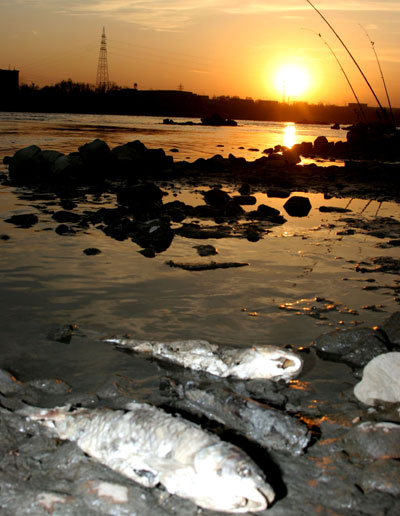|
Toxic water of polluted river reaches Harbin
(AFP/Reuters/China Daily)
Updated: 2005-11-24 05:40
The front of the polluted water of Songhua River in northeast China reached
Harbin, capital of Heilongjiang Province, on early Thursday morning, local
environment authority said.
|

Polluted Songhua River is seen as
the State Environment Protection Administration confirmed Wednesday that
pollutants containing benzene and nitrobenzene contaminated the river
after a chemical-plant blast at the upper reaches in Northeast China.
[sina.com]
|
The toxic benzene-contaminated water, flowing down from the upper reaches of
Songhua River, from which Harbin draws its drinking water, arrived at the
local water supply inlet at about 5 a.m..
Harbin, home to nine million
population including 3.8 million in the urban districts, has cut off water
supply in the urban areas since early Wednesday, an emergency action taken to
ensure public safety.
The operation of the city's water supply system was temporarily resumed on
Wednesday afternoon following a forecast by China's State Environmental
Protection Administration (SEPA) that the polluted water will not reach the city
until Thursday.
China confirmed Wednesday that an explosion at a petrochemical plant had
caused "major pollution" of the Songhua River.
The explosion at a PetroChina factory in the northeastern province of Jilin
led to an outpouring of the carcinogen benzene into the 1,897-kilometer-long
(1,176-mile) Songhua river, the Environmental Protection Administration (EPA)
said Wednesday.
"After the blast at the chemical plant the monitoring station in Jilin found
that benzene went into the river and polluted the water," the EPA said in a
statement on its website.
"Benzene levels were 108 times above national safety levels."
Zhang Lanying, director of the Environment and Resources Institute of Jilin
University, said that benzene which does not dissolve in water is a dangerous
substance.
People who drink water with a little benzene can have oral festering.
"Massive amounts can lead to the disorder of blood cells; in other words,
leukaemia," she said.
"Harbin's move to cut off the water supply was not a knee-jerk reaction. "
|

Dead fish can be seen in the Songhua River as
the State Environment Protection Administration confirmed Wednesday that
pollutants containing benzene and nitrobenzene contaminated the river
after a chemical-plant blast at the upper reaches in Northeast
China. [newsphoto]
|
"If the contaminated water had been supplied to households, the result would
have been unimaginable."
Xinhua news agency quoted government sources as saying that Harbin needs
1,400 tons of active carbon to purify the contaminated water in the Songhua but
is currently 700 tons short.
The polluting material index had dropped to 29 times above national safety
levels when the contaminants reached the border of Jilin and Heilongjiang on
Sunday, the EPA said.
The provincial government had warned Harbin residents to stay away from the
river to avoid possible exposure to airborne contaminants coming off the water.
Before the taps were closed at midnight on Tuesday, panicked residents rushed
stores to stock up on food and water in a city where winter temperatures
regularly drop below minus 20 Celsius.
|